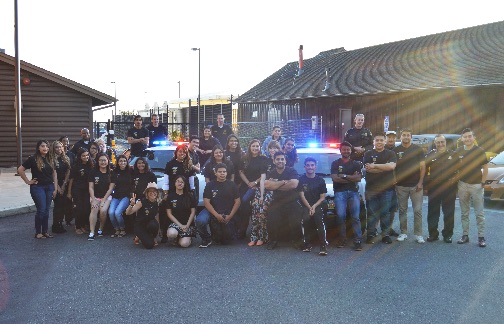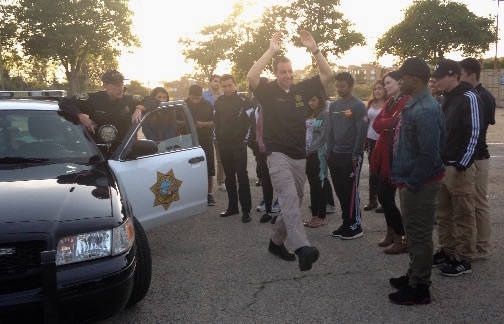UC Santa Cruz sophomore Silvia Ordonez grew up in one of Los Angeles’s most densely populated communities, surrounded by criminal street gangs, and three blocks from the Rampart Division of the city's police department, which made headlines in the late 1990s for widespread corruption.
So maybe it wasn’t surprising that given a gun belt with handcuffs, inert pepper spray and a rubber handgun, she reacted as she did during a classroom scenario that was part of the UC Santa Cruz Police Department’s spring 2016 Citizens Police Academy. Sent out to investigate an abandoned golf cart as part of the scenario, she immediately encountered a man—another student acting the part—who shouted, “Hey, what are you doing with my vehicle?” Ordonez grabbed her gun and immediately pulled the trigger.
“You see how quickly these things happen, how quickly they can escalate, and how what you do can look to the public,” said Officer Nathaniel Calhoun, who was overseeing the scenario.
Ordonez was one of 31 students who graduated from the Citizens Police Academy in June. The nine-week program is offered three times a year to give a behind-the-scenes, hands-on perspective of the roles and responsibilities of law enforcement. The course covers such topics as community-oriented policing, crime classifications, constitutional rights, DUI/drug use, search and seizure, defensive tactics, and evidence processing.
In another scenario, psychology major Maddy Brokman drove a police cruiser with Chief Nader Oweis in the passenger seat. Told that the car in front of her might have been speeding, she turned on the overhead lights and signaled the driver to pull over. She parked, pulled the emergency brake, and got out to investigate.
“You don’t realize just how much goes into a simple traffic stop,” Brokman said. “You have to make decisions in a split second. It’s much harder and more stressful than it looks.”
During another class, the students visited the Santa Cruz County Jail on Water Street. Brokman described that experience as “very surreal and disturbing—a little like a TV show and also like being at a zoo. They’re locked up, and we’re peering in.”
Luis Arroyo, a fourth-year student majoring in sociology, said he appreciated getting an insider view into the world of public safety, and now he’s considering a career in law enforcement.
He wouldn’t be the first graduate of the program to do that. Wesley Huynh, who went on to become a UC Santa Cruz police ambassador after citizens academy, graduated last year with a degree in business management economics and is now a sworn officer with the Oakland Police Department.
Oweis has run the citizens academy since 2011, when he took over the department after serving 20 years with the UC Davis Police Department.
As part of the program, he said he wants to dispel misperceptions that policing is an easy job and demonstrate how service to the community is the overarching philosophy of the department.
“We stress critical thinking to understand the role of law enforcement as peacekeepers, caretakers, and enforcers of the law, when it is reasonable and prudent to enforce,” he said. “Most of all, we try to humanize the badge.”




